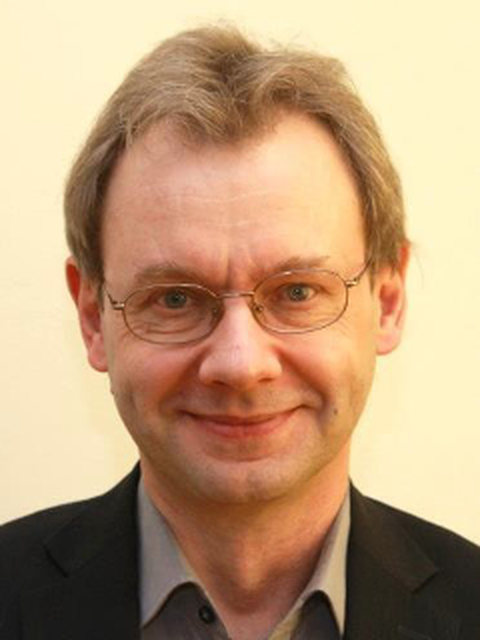Prof. Dr. phil. Thomas Goschke
Research focus
- Psychological and neural mechanisms underlying human volition, cognitive control, and intentional action
- Meta-control and adaptive regulation of cognitive control
- Emotional modulation of cognitive stability and flexibility
- Neurocognitive mechanisms underlying real-life self-control failures
- Dysfunctions of cognitive control, performance-monitoring, and value-based decision-making as transdiagnostic mechanisms and vulnerability factors for substance use disorder and behavioral addictions
Table of contents
Curriculum Vitae
|
Goschke, Thomas, Prof. Dr. phil. |
|
|
Official position |
Professor for General Psychology (W3) Dean of the Faculty of Psychology, TU Dresden Director of the Institute of General Psychology, Biopsychology, and Methods of Psychology |
|
Institution |
Faculty of Psychology Technische Universität Dresden |
|
Business address |
01062 Dresden |
Academic education and degrees
|
1979-1987 |
Studies of Psychology and Philosophy, Ruhr-Universität Bochum |
|
1987 |
Diploma in Psychology (with distinction), Ruhr-Universität Bochum |
|
1992 |
Dr. phil. (summa cum laude), Universität Osnabrück |
|
1999 |
Habilitation in Psychology, Universität Osnabrück |
Professional career
|
1987-1993 |
Doctoral student, Department of Psychology, University Osnabrück |
|
1993-1999 |
Postdoctoral Research Associate (C1), Department of Psychology, University Osnabrück |
|
1995/1996 |
Visiting Faculty Member, Institute for Cognition and Decision Sciences, University of Oregon at Eugene (two stays funded by the DAAD) |
|
1997 |
Interim Professor for General Psychology (C4), TU Braunschweig |
|
1999-2000 |
Assistant Professor (C2), University Osnabrück |
|
2000-2002 |
Senior Scientist, Max-Planck-Institute for Psychological Research, Munich (Cognition & Action Unit, Prof. Wolfgang Prinz) |
|
Since 2002 |
Professor (W3) for General Psychology, Department of Psychology, TU Dresden |
|
Since 2003 |
Director of the Institute for General Psychology, Biopsychology and Methods of Psychology |
|
2003-2018 |
Elected Member of the Faculty Board, Faculty of Science, TU Dresden |
|
2004-2009 |
Head of the Department of Psychology, TU Dresden |
|
2004-2009 |
Head of the Department of Psychology, TU Dresden |
|
2012-2014 |
Member of the Senate of the TU Dresden |
|
2014-2018 |
Head of the Department of Psychology, TU Dresden |
|
Since 2018 |
Elected Member of the School Committee of the School of Science, TU Dresden |
|
Since 2014 |
Member of the Senate of the TU Dresden |
|
Since 2019 |
Dean of the Faculty of Psychology, TU Dresden |
Honors, awards and positions
|
Since 1993 |
Ad hoc Reviewer for various funding agencies (e.g., DFG, Volkswagen Stiftung) and scientific journals (e.g., JEPL:LMC; JEP:HPP; Cognition; Neuropsychologia; Neuroimage; Brain Research.; Psychophysiology; Quart. J. Exp. Psychology) |
|
1989-1990 |
Fellow of the Research Group Mind and Brain, Center for Interdisciplinary Research (ZiF), Bielefeld |
|
2005-2010 |
Spokesperson of the interdisciplinary research consortium “Control and responsibility: Investigations on the nature and culture of volition” funded by Volkswagen Foundation |
|
2007-2009 |
Founding member of the Scientific Board of the European Platform for Mind, Life, & Brain Sciences, Volkswagen-Foundation |
|
2009-2014 |
Member of the Scientific Advisory Board, European Post Graduate School in Addiction Research ESADD |
|
Since 2012 |
Spokesperson of the Collaborative Research Centre (SFB 940): “Volition and Cognitive Control: Mechanisms, Modulators, Dysfunctions” |
|
2013 |
Karl und Charlotte Bühler Lecture Award of the Department of Psychology |
|
2015 |
Organizer of the Dresden International Symposium “Have We Banished the Homunculus? Dynamic Regulation, Modulation, and Optimization of Cognitive Control” |
|
2017 |
Organizer (with Clemens Kirschbaum and Annette Bolte) of the 59th Conference of Experimental Psychologists (TeaP) |
|
2018 |
Organizer (with Veronika Job) of the Dresden International Symposium “Volition and Self-Control: From Metaphors to Mechanisms” |
Current journal editorial positions
|
Since 2019 |
Guest Editor (with Ben Eppinger and Sebastian Musslick) of a Special Issue on “Meta-control” in Cognitive, Affective, and Behavioral Neuroscience |
10 most important peer-reviewed papers
(10 out of 100, SCOPUS h-index: 32)
Krönke M, Wolff M, Mohr H, Kräplin A, Smolka M, … Goschke T. Predicting real-life self-control by brain activity encoding the value of anticipated future outcomes. Psychological Science. 2020;31(3),268-279.
Kräplin A, Scherbaum S, Bühringer G, Goschke T. Decision-making and inhibitory control after smoking-related priming in nicotine dependent smokers and never-smokers. Addictive Behaviors. 2019;88,114-121.
Krönke KM, Wolff M, Mohr H, Kraplin A, Smolka MN … Goschke T. Monitor yourself! Deficient error-related brain activity predicts real-life self-control failures. Cognitive, Affective, & Behavioral Neuroscience. 2018;18(4),622-637.
Wolff M, Krönke KM, Venz J, Kraplin A, Buhringer G ... Goschke T. Action versus state orientation moderates the impact of executive functioning on real-life self-control. Journal of Experimental Psychology: General. 2016;145(12),1635-1653.
Kräplin A, Behrendt S, Scherbaum S, Dshemuchadse M, Bühringer G, Goschke T. Increased impulsivity in pathological gambling: Considering nicotine dependence. Journal of Clinical and Experimental Neuropsychology. 2015;37(4),367-378.
Krönke KM, Wolff M, Benz A, Goschke T. Successful smoking cessation is associated with prefrontal cortical function during a Stroop task: A preliminary study. Psychiatry Research. 2015;234(1),52-56.
Goschke T. Dysfunctions of decision-making and cognitive control as transdiagnostic mechanisms of mental disorders: advances, gaps, and needs in current research. International Journal of Methods in Psychiatric Research. 2014;23(1),41-57.
Goschke T, Bolte A. Emotional modulation of control dilemmas: The role of positive affect, reward, and dopamine in cognitive stability and flexibility. Neuropsychologia. 2014;62,403-423.
Dshemuchadse M, Scherbaum S, Goschke T. How decisions emerge: Action dynamics in intertemporal decision making. Journal of Experimental Psychology: General. 2013;142(1),93-100.
Plessow F, Fischer R, Kirschbaum C, Goschke T. Inflexibly focused under stress: acute psychosocial stress increases shielding of action goals at the expense of reduced cognitive flexibility with increasing time lag to the stressor. Journal of Cognitive Neuroscience. 2011;23(11),3218-3227.

